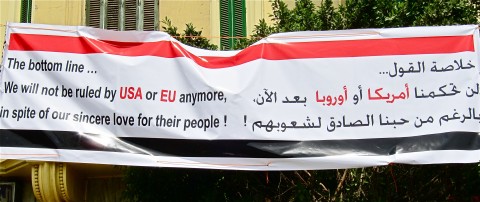
It is easy to feel separated from the “real world” outside of our insulated campus. As revolutionary movements began to spread throughout the Middle East, students, staff and faculty alike tried to keep pace with the flood of information channeling through news sources. Recently, government professor Alex Hybel decided to circumvent the limitations of the media and visit Egypt himself to witness the process of democratization that is unfolding in the country.
As a professor who is passionate about the study of international politics both within the classroom and beyond, Hybel visited the volatile region with the intent of gaining a better understanding of this foreign part of the world. “I thought it would be a perfect opportunity for me to expand my knowledge and to test some of my own ideas,” Hybel explained.
While the world looks on with hope for democracy in the country, Hybel is less optimistic. “What you have in Egypt is what one could expect: that essentially after forty years of being totally controlled by one leader and his elite group, the country is now trying to experiment, trying to figure out what to do,” he explained. Without a history of democracy, the nation has no national rubric from which to draw influence and ideas. The people are now faced with challenges of democracy that they have never had to deal with before.
Perhaps the most fateful of these challenges will be the necessity to organize into political parties for the upcoming elections in September. “The only groups that know how to organize themselves are the Muslim Brotherhood and the National Democratic Party, the party to which Mubarak owed allegiance,” said Hybel. While the youth were absolutely pivotal in the orchestration of the revolutionary movement, their success in creating competitive political parties has been lacking. As is the case with the rest of the populace, they simply have never been allowed this privilege of democracy.
Although the state of political activism in the country may seem underwhelming in the wake of the momentous revolution, many of the citizens have remained persistent in their demands for political freedoms and justice, with the youth continuing to drive the helm of the protests. During his stay in Cairo, Hybel was able to attend a youth-organized demonstration demanding that Mubarak and his associates be brought to justice. While the protesters remained motivated by the ideals of the revolution, they could no longer claim strength in numbers.
During the revolt, many people were more than willing lay down their lives for the movement. Living under a despotic and oppressive leader, the people did not stand to lose as much as they do now. Today, Egypt’s citizens are faced with a chance for political and social progress but they are also confronted with the realities of living in an economically crippled state.
What is hurting most of all is the tourism industry, a sector of the economy that has been central to Egypt’s relative wealth in the region. “I would be wandering for a full day and not see a single Westerner,” Hybel recounted. “That is very strange.”
The military government has used the damaged economy to its advantage. Beyond the fact that people are now returning to work and cannot afford to attend protests, the government has now implemented measures that discourage large demonstrations, claiming that all they do is harm the economy. While this claim has been used to justify the undemocratic suppression of the opposition, there is an element of truth to their argument.
“In fact, they get a lot of support from the people because, when the revolt ensued, the population was worried that if it went on for too long, it would cost them from an economic standpoint,” he said. Clearly, mass protests can interrupt economic activity, especially tourism; still, Hybel interpreted the government’s containment of the opposition as more than just the result of economic interests.
“The military is not going to allow radical change that would ultimately undermine its power,” he said.
The Egyptians’ fight for freedom is not over. While a paradigm shift has been set into motion, the legacy of Mubarak’s dictatorship and Egypt’s long history of authoritarian rule continues to permeate the social, political, and military culture of the country. The changes that will be necessary in order for Egypt to live up to the revolution’s ideals of freedom will not be achieved overnight. Hybel thinks it’ll take at least three or four generations.
Despite the overwhelming challenges that Egypt is dealing with, the people remain optimistic and friendly. In fact, one of Professor Hybel’s strongest impressions of the country’s people was their hospitality.
“I’ve traveled to probably more than fifty countries. I’ve never been welcomed anywhere as I was welcomed in Egypt. One time I got completely lost and this person literally walked me back to the hotel and they didn’t have any reason to do so,” Hybel recalled.
This positivity was evident even along the border of Libya, a region overflowing with immigrants escaping Colonel Gaddafi’s brutal military forces. The people here are without homes and many have been separated from their families; Hybel saw many people wrapped in thin blankets, sleeping outdoors and huddling for warmth.
“I was there with my own private car. I had a driver and I slept in the van and remained very warm. I could not escape that disparity, that disconnect between they and I. And yet they saw me and they smiled at me,” Hybel recollected.
Professor Hybel’s willingness to venture into the unstable revolutionary state of Egypt is central to his philosophy as an academic and citizen of the world. We can learn only so much from newspapers and television and textbooks; our interests must extend beyond the classroom and into the real world. •









